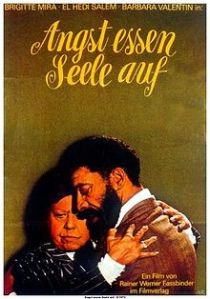Roger Ebert’s The Great Movies continues to teach me new things, this time in the form of Ali: Fear Eats the Soul, the 1974 film from Rainer Werner Fassbinder, a director whose name I have heard a lot, but whose work I come to without any prior experience. What I found was an incisive indictment of prejudice in 70s Germany.
Ali stars Brigitte Mira as Emmi and El Hedi ben Salem as the titular character, with whom Emmi establishes a whirlwind romance of sorts. Ali is at least twenty years Emmi’s junior, but the age discrepancy is not the major obstacle in the couple’s way. Emmi and Ali must also fight the casual racism against people of Middle Eastern origin that appears to have been rampant in Germany at the time.
I was never much of a history scholar. Science was more my thing, so I don’t know much about the particular past of most countries – I barely know anything about the forging of my own country, let alone others. So the ubiquitous racism that Fassbinder depicts came as a bit of a surprise. I guess I was living under the impression that after World War II Germans wanted to distance themselves from the shameful deeds that had occurred, and magically became universally accepting of other people. That’s on me; that’s my naïveté (or ethno-centered mindset, whichever sounds more likely to you). Of course tolerance isn’t created over night – despite the fact that it absolutely should be. I can’t know fully if this is a completely accurate presentation of what mid-70s Germany was like, but I have to trust that Fassbinder is showing us at least a somewhat accurate view of the country at the time.
Fassbinder experienced some of the prejudices firsthand. He grew up in immigrant-filled communities and surely experienced his own discrimination as an openly bisexual man (or out-and-out homosexual, depending on which former female lover you ask). Fassbinder was certainly sympathetic to the plight of the down-trodden, making him the ideal filmmaker to take on the subject.
His choice to do so via an interracial couple lends the movie an extra level of emotion, though the movie never tells you outright how invested either party is in the central relationship. At times Emmi seems to want Ali merely for his presence, rather than out of any real affection. She takes to treating Ali like an object, showing him off and giving him orders as opposed to treating him like a human being (perhaps betraying that she is not as progressive and open-minded as the ex-Nazi party member and widow to a Pole likes to think she is).
Ali’s affections, on the other hand, are more of a mystery. There are only three or four scenes in the whole film that feature Ali apart from Emmi, but it is in these moments that we get to see what the relationship means to him. About halfway through the film he shows clear signs of caring about his partner, defending her against the friends who look down on the relationship. As Emmi’s worse traits start to poke through, Ali rightfully becomes more distant. Ali speaks the title line early in the film: “fear eats the soul.” Ali doesn’t allow himself to feel fear, but he does not allow himself to feel any other emotions either. As the feature draws to a close Ali has to reconcile his actions with how he feels, but he struggles with whether he can embrace his better emotions without also embracing his fear.
Fassbinder has a reputation as the bad boy of “German New Wave.” Considering the commentary associated with this picture, that title is most likely earned. But – at least in Ali: Fear Eats the Soul – the filmmaker backs this controversy up with a strong vision and salient arguments that (unfortunately) continue to be relevant today.

Love this film! Fassbinder is an incredible director – it’s a shame he died so young. 😦